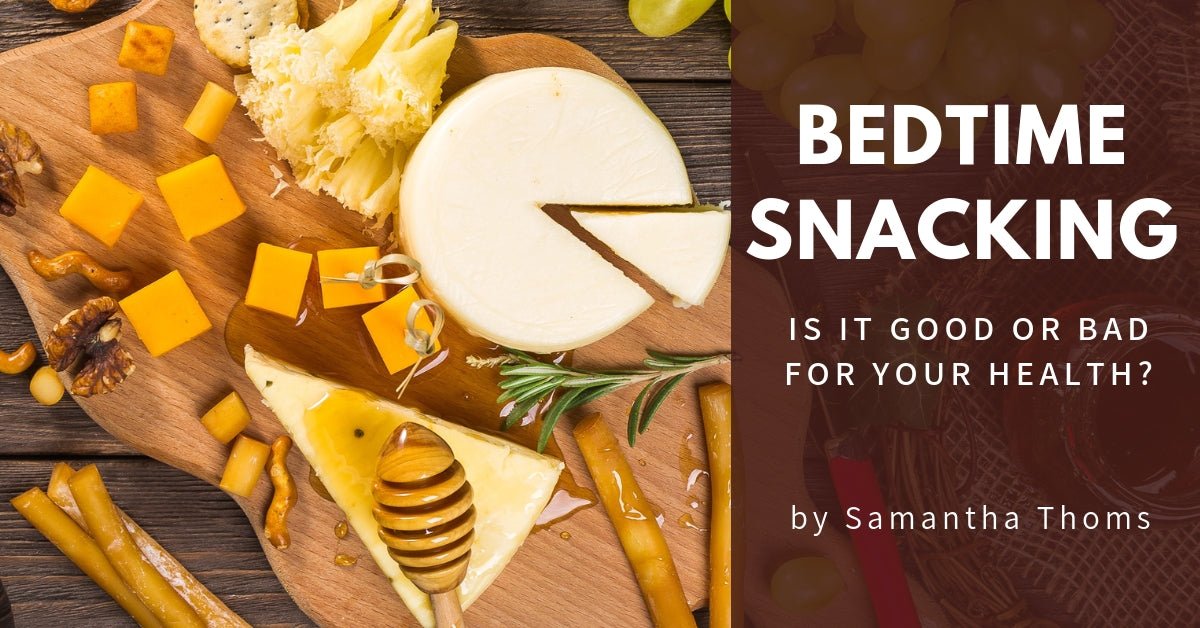shop
learn

Should You Eat Before Bed? What the Science Says
June 26, 2019 4 min read
Should you eat before bed? Unfortunately, the answer to this question varies based on who you ask.
Some experts blame bedtime eating for poor health and unhealthy weight gain. Others disagree, and research exists to support both sides.
But not so fast. Don’t put the snacks away just yet.
Keep reading as we dive into the science of eating before bed and whether or not you should have that snack.

Is it Bad to Eat Before Bed?
Some research has linked eating before bed with increased body mass, blood sugar and cholesterol levels.
However, bedtime eating itself may not be the culprit. Many times, other behaviors that often go hand in hand with bedtime eating can cause problems.
For example, let’s say you skip breakfast.
By dinnertime, you likely speed straight past hungry and into ravenous territory. Thanks to those powerful hunger hormones, your body demands pizza. That baked fish you were planning on having becomes a distant memory.
Many breakfast skippers develop the habit of eating very heavy meals late in the evening.
This can be problematic because of what's known as circadian misalignment.
Generally speaking, our bodies run on a 24-hour biological clock. The daylight hours are known as the active phase and night hours are the inactive phase. During the active phase is when our bodies are best prepared to digest and burn the food we eat as fuel.
The body has a greater tendency to store extra calories as fat and does not process carbohydrates as well during the inactive phase.
This is why some experts believe nighttime eating can lead to weight gain and altered blood glucose and cholesterol levels.
Eating late may also lead to overeating simply due to being awake for long hours.
If you are a night owl running on less than the recommended amount of sleep, you have more opportunities to feel hungry and to eat. Also, having large meals before bed can reduce sleep quality.
But the truth is, not everyone who eats late winds up gaining more weight or facing more health problems.
How bedtime eating will affect your body and your health differs based on your unique lifestyle.
Always talk it over with your doctor or registered dietitian before you make any major changes in your eating habits.
If you have a small snack before bed and usually eat most of your meals during the day, there are some potential upsides.
What Are The Potential Benefits?
For some, having a small snack before going to bed might prevent waking up in the middle of the night to snack.
In one study, researchers recruited 84 men and women who reported nighttime snacking and instructed half of them to add a bowl of cereal for a bedtime snack.
After just four weeks, those who had the cereal reduced their nighttime snacking and actually lost a small amount of weight.
It seems that having a small snack before bedtime may help some people cut down on nighttime snacking that could be contributing to weight gain.
Another possible benefit of having a bedtime snack is improved muscle synthesis and strength.
In another study, researchers had 22 young men drink a protein shake every night before bed while they completed a 12-week resistance training program.
Researchers found that muscle strength and size increased more in the group that had the shake, compared to the group that didn’t.
Meal timing and bedtime eating is an area of research that needs further exploration.
But if you want a bedtime snack, go for it.
Just take care to select an appropriate snack.
What Foods Should You Eat Before Bed?
Avoid having very fatty foods or large meals right before bed.
Try to have your largest meal no later than early evening.
If you do find yourself getting hungry before bed, a small snack is ok.
Most research studies that show benefits of a bedtime snack have provided participants with high protein drinks or snacks that contain less than 200 calories.
What is the Best Bedtime Snack and When Should You Have it?
You can plan to have your bedtime snack whenever you feel like it!
There is not a magic window for most people, but there are a couple of considerations.
Those who are athletic should have meals and snacks within a few hours of working out. A replenishing bedtime snack contains both protein and a bit of carbohydrate.
Eating late can worsen acid reflux, so it may be wise for those with this problem to stop eating several hours before bed.
Choose snacks that contain a decent amount of protein but aren't too heavy. For example:
- Plain or lightly sweetened greek yogurt
- Milk with lightly or unsweetened cereal
- String cheese and berries
- Nut butter and celery or carrots
- Hummus and whole grain crackers
- Protein shake (1 scoop protein powder + low-fat milk )
Conclusion
In conclusion, eating before bed can sometimes be bad, but it depends on what you eat, how much you eat, and when you eat most of your meals.
With a few simple guidelines, your bedtime snack does not need to negatively impact your health or sleep. In fact, read our article on 10 Foods That Can Help You Sleep Better!

Leave a comment
Comments will be approved before showing up.
Also in Health
Subscribe
Sign up to get the latest on sales, new releases and more …
Join the Utzy Naturals Club!
Sign up and get the latest on sales, new releases, and more...





